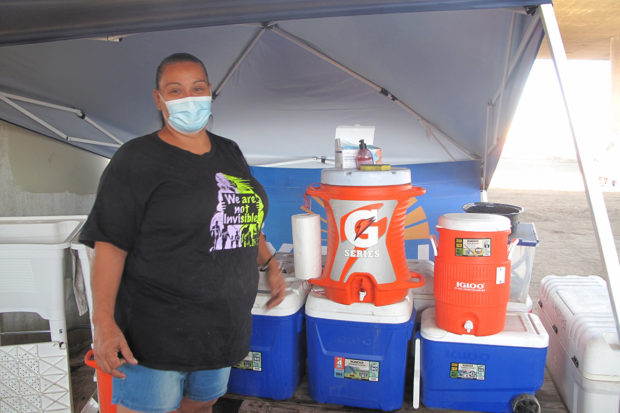
By Dixie Salazar
It should come as no surprise to anyone that during this coronavirus health crisis, Fresno County now faces an equally dire homeless crisis. Even before the virus hit, homelessness was quickly spiraling out of control.
Have you ever wondered how the homeless choose their locations to set up camp? When I asked this question of a group of homeless, they said the homeless task force tells them where they can go, chasing them around the city in an endless and futile shell game the homeless always lose.
In the meantime, our city is filling up with uncollected garbage and the unhealthful discarded litter of broken-up camps. Isn’t it time we tried something different?
First, we need to recognize that the homeless are human beings who have needs and desires just like you and I. They are not all drug addicts and mentally ill. However, the longer a person stays homeless, the greater the risk of falling into negativity and downward mental spirals.
In the words of Dez Martinez, a formerly homeless woman who is now on a mission to help her street friends, “Being homeless can cause mental illness. People don’t realize the trauma suffered every day by living on the streets.”
Martinez is putting together a model, Covid-safe, clean, organized camp, with showers, toilets. cooking facilities and strict rules, especially against hoarding, an affliction that leads to the unsightly piles of debris left all over our city.

So what can be done?
No. 1 on my list of proposed solutions: Safe, legal campgrounds that would save the city millions of dollars now going toward cleanup, overburdened emergency response services and chasing down ineffective ordinance violations. Also, it would be much easier to transition eligible folks into housing as it becomes available, as they could more easily be tracked and located.
The city has consistently rejected campgrounds in favor of housing, but where is all that housing they keep talking about? The need for housing is far outstripping the city’s ability to provide, and that’s only getting worse.
The homeless population is swelling daily, especially with current economic trends. Both the city and state have land that could be used right now. It’s time to quit talking—the need is immediate. And we can have both: housing and safe, legal campgrounds; one doesn’t need to preclude the other.
No. 2: Abolish the homeless police task force. In my conversations with folks on the street, I hear over and over about harassment, outright abuse, confiscation of personal property and disrespectful treatment, instead of help coming from the police. They aren’t trained to work with this population.
Replace the homeless police task force with a coalition of social workers and homeless advocates who have been in the trenches, know the people on the streets, are trusted by them and know what they need.
Criminalizing the homeless not only does not help them but perpetuates the cycle of poverty. Poverty is punishment enough and punitive measures against being poor are actually unconstitutional, not to mention mean spirited and heartless.
No. 3: The city and county need to start working together to address homelessness, without passing the buck back and forth, finger pointing, blame, infighting, territorial squabbles and outright cronyism that ends up lining the pockets of developers. We need them to cooperate and join with their constituents to problem solve the homeless crisis (interconnected with the health crisis) today—not in some future time that might be too late.

There are many solutions out there. The Dakota Eco Garden is one alternative, operating on a shoestring, with no government financing, an environmentally friendly, green, uplifting transitional living center, with a proven track record. Art Dyson’s Eco Village Project could also provide a sustainable, dignified, eco-friendly alternative. There are others that have proven successful. The answers are out there—the city just needs to work with those who are already doing the work.
To help or get involved, contact wearenotinvisiblefoundation@gmail.com (Dez Martinez). For more information on the Eco Village Project or the Dakota Eco Garden, visit www.ecovillagefresno.org or call 559-225-2767.
*****
Dixie Salazar is the secretary of the Eco Village Project and a consultant and board member for the Dakota Eco Garden.

